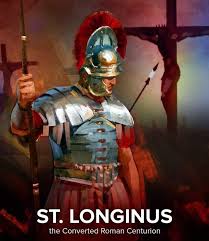Did you know that four Italian cities – Rome, Reggio Calabria, Syracuse, and Pozzuoli – are mentioned in the Bible, or that the first non-Jew that the Apostles converted to Christianity was an Italian?
It is safe to say that Christianity itself might well have remained a minor Middle Eastern sect had it not been for the Italian domination of the Mediterranean two millennia ago. The legions of Italy had eliminated borders, constructed a marvelous network of highways, planted colonies of veterans across the far-flung empire, and secured the sea lanes of the Mediterranean. What better conditions would there be for Apostles to travel and preach the Gospel?

We needn’t look deep to document an Italic presence in the New Testament. “And it came to pass in those days, that there went out a degree from Caesar Augustus … ” Augustus, founder of the Roman Empire, was one of five Roman emperors who ruled at the time of the Apostles (Augustus, Tiberius, Caligula, Claudius, and Nero). Individuals such as Roman centurions and Pontius Pilate were a necessary part in the birth of Christianity.
“Speak but the word and my servant shall be healed,” was uttered by a Roman centurion (captain). His name is lost to us but he was an early gentile follower of Jesus. If this soldier was any indication, there was a degree of cooperation and respect between many Italic soldiers and the Jewish population at that time. St. Luke reports that this centurion not only had the deepest respect for Jews, but had even built them a synagogue in the city of Capernaum. Jesus marveled at this centurion’s total faith in His power to heal the sick ‘remotely.’ He used such faith as an example to his followers. (Luke 7:1-9). Moreover, Christ was moved to utter the words that would spur the future conversion of non-Jews. “And I say unto you, that many shall come from east and west, and shall sit down with Abraham, Isaac, and Jacob in the kingdom of heaven” (Matthew 8: 11).
As though to launch Jesus’s policy of “open enrollment” for the new religion, the Apostles later baptized their first gentile convert, surprisingly, another Roman centurion. He was Cornelius of the “Italian Cohort” (a battalion-sized unit of a legion) stationed in Caesarea. Much like the first centurion, Cornelius was a man of great compassion known for his charity and devotion to the god of the Jews. The baptism of Cornelius and a coterie of his non-Jewish friends created a theological stir in Judea. Here for the first time circumcision was not required to be a Jewish Christian (Acts 10:1-48, 11:1-3).
Italic legionaries were Jesus’s more tolerant and believing admirers. Even at the foot of the cross, it was a centurion who is quoted as saying, “Indeed, this was the Son of God!” [Mark 15:39]. That centurion was named in the Gospel of Nicodemus as Longinus (LON-gin-us). It was Longinus who was sent by Pontius Pilate to verify Jesus’s death by spearing his side. Although the Gospel of Nicodemus is not part of the New Testament, Longinus became legendary in Christian lore and is now a recognized saint.
Pontius Pilate was one of many Roman officials who had to deal with the early evangelists of Christianity. These early Christians provoked mob anger. Often, the Apostles had to be arrested for their own protection. St Paul was such a prisoner. He happened to be a Roman citizen entitled to appeal directly to the Emperor for exoneration. He was sent to Rome to stand trial, escorted by the centurion Julius, of the Augustan Cohort. The Bible informs us that Julius spared Paul’s life from summary execution when the ship foundered on Malta and it was feared that the prisoners might escape (Acts 27).
Upon reaching Italy Paul spent two years under house arrest, utilizing his time to correspond (the Epistles) with Christian communities around the Empire. His presence probably infuriated the local Jewish community in Rome who considered Christians to be blasphemers. Roman author Suetonius reported that the two sects became so combative that Emperor Claudius banned them from the city. Paul hit the road again; but his luck ran out under Emperor Nero when he was beheaded; blamed for the Great Fire of Rome, A.D. 64.
Is it any wonder Italians came to lead Christianity? – JLM

For me, it is of great significance that, according to traditional belief, St Peter preached in the ancient Roman city of Fregellae (located about 50 miles south of Rome). The present-day city of Ceprano, which was built on the site of Fregellae, is where my parents were born and spent their early years.
And that is 54 miles from Settefrati where my family is from.!
Many Italian Americans and Canadian Americans have their family origins in this part of Italy. Some famous Italians, such as Marcello Mastroianni and Vittorio Di Sica, also came from this area.